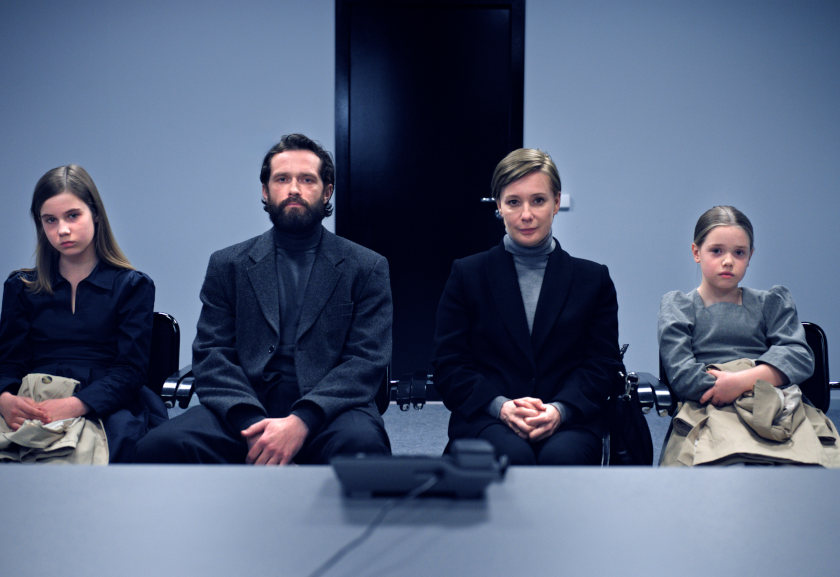Vassilis Kroustallis reviews the Venice drama 'Quiet Life' by Greek director Alexandros Avranas.
Alexandros Avranas' fifth feature (known for the 2013 'Miss Violence' and 2017 'Love Me Not') 'Quiet Life' couldn't be further apart from John Krasinski's 2018 silent horror 'A Quiet Place', the latter being a silent effort to hold a family together during external monster turbulence. Yet, the multi-European produced, pleasingly chilly arthouse film (which had its world premiere in the 2024 Venice Orizzonti slot), shares some of the US counterparts' affinities. Instead of monsters, the Swedish-set, clinical-looking, mildly post-apocalyptic flirting film brings contemporary worries (and enemies) to the fore. And instead of the sign language of the Krasinski flick, we get stylized facial gestures and smiles (all to save the family).
Child resignation syndrome is a recent clinical condition investigated in Sweden, which leaves children almost unable to function behaviorally. It mainly affects children from immigrant families seeking asylum (predominantly from Russia or the Balkans), who have to suffer all the excruciating bureaucracy to get (or be denied) the desired permanent work permit. Some children eventually recover, yet their condition and cure remain a mystery. In Avranas' first scene, we are introduced (all four family members facing the camera, ready for their family photo) to the Russians Sergei (Grigory Dobrygin) and Natalia (Chulpan Khamatova, 'Petrov's Flu', a well-registered performance here), and their two daughters, Alina (Naomi Lamp) and the younger Katja (Miroslava Pashutina). The first -and not always discreet- visit of Swedish officials to their temporary place (the family is seeking asylum as political refugees) gives its place to a very formalized and ritualized rejection decision; Katja mysteriously falls into a coma soon afterward and needs to be hospitalized. Sergei and Natalia must cope with the state bureaucracy and the clinic's Instagram-like compulsive philosophy of 'feeling happy' -as oppressive as the state officials.
While Avranas has portrayed untenable family relations before, here (along with his co-screenwriter Stavros Pamballis), he is more interested in the external dialectic of oppression (rather than its internalized, appropriating form). This makes the whole of 'Quiet Life' a medically inspired film experiment, yet not the let-it-all-loose variety of some celebrated Greek Weird Wave films (including Avranas' own). Avranas grounds instead his narrative with a much-evident concern for the predicament of immigrant families in Sweden, whose condition remains invisible. The narrative functions like a gateway to this mystery, and it lends its structure into an easily discernible (but not named) three-chapter division, the asylum procedure, the clinic, and the family 'reunion'). The film's style and tone shift from the setup of the first part to its grotesque notes of good parenthood in the second act, culminating in the much-needed partial relief of the resolution.
The concept of the impersonal, impeccably invading enemy is given a lot of help from the film's carefully constructed visual ambiance. The cinematographer Olympia Mytilinaiou's play with whites and greys and the production design's stern flat arrangements (but check the third act's family flat for an overturn) solidifies approaching, unnamed danger. ('Quiet Life' is set in 2018, before the COVID-19 virus and Russia's 2022 Ukraine attack). Yet, as much as we need medicine to endure a Kafkaesque nightmare, 'Quiet Life' seems to leave its battlefield too soon, as if afraid to move into a much more cynical (and ultimately nihilistic) territory. Even though Sergei and Natalia enter the monster territory themselves at times (a brilliant scene with them and Alina coached to say the right thing), the film still relies heavily on its humane ray of light, and its post-weird mentality seems at times more granted than earned. This makes the film present brilliant moments (the scenes with the children interrogated by the Swedish asylum authorities) and well-meant but rather unjustified scenes (the car trip singing scene).
At the same time, 'Quiet Life' offers a strong caveat on what should be considered a state-instituted 'therapy' in all social contexts, and the kids' performances (especially Naomi Lamp as Alina) offer a well-fought earnestness to combat an impersonal system more oppressing than the medical condition itself. The film ultimately places its hopes on the individual (but still in the narrative context of an otherwise bleak story). It connects you with its characters (never just victims of the system) and guides you through their story. It is coolly appealing and executed with flair.
Vassilis Kroustallis

